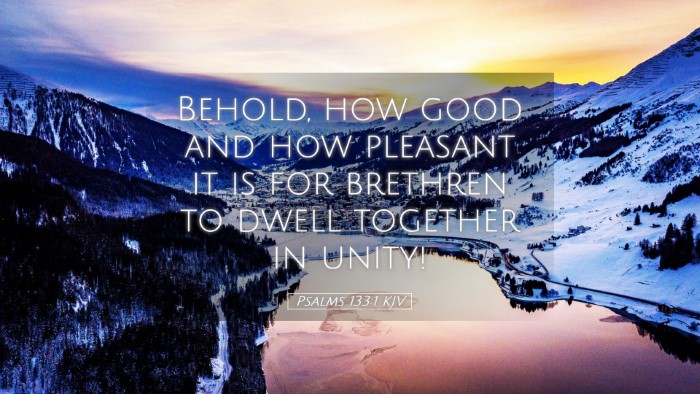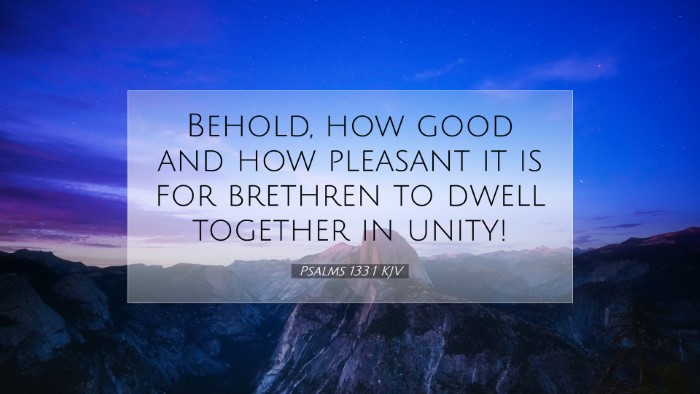Psalms 133:1 - Summary and Commentary
Verse: "Behold, how good and how pleasant it is for brethren to dwell together in unity!"
Introduction
The verse from Psalms 133:1 expresses a profound truth about the beauty and joy of unity among people, particularly within the community of believers. This sentiment captures the essence of communal harmony and the value placed upon fellowship among those who share faith in God. The insights from various public domain commentaries shed light on the implications of this verse for personal, communal, and spiritual life.
Matthew Henry's Commentary
Matthew Henry emphasizes the significance of unity within the body of believers. He notes that the psalmist calls attention to a great virtue: brotherly unity. Henry describes this unity as not only desirable but essential for spiritual growth and strength. He asserts that the metaphor of "dwelling together" suggests a close and enduring relationship among God’s people, where love and mutual support create an environment conducive to God’s blessings.
He elaborates on the notion that unity is the source of God's favor and feels that when brethren dwell together in harmony, they demonstrate the transformative power of the Holy Spirit. He concludes that such unity is good and pleasant because it reflects the very nature of God who, in His triune essence, embodies perfect unity.
Albert Barnes' Notes on the Bible
Albert Barnes provides a detailed analysis of the term "good" and "pleasant." He interprets "good" as an expression of moral rectitude and divine approval, affirming that unity is a reflection of God's will for His people. For Barnes, the experience of unity is described as not merely a passive state, but an active engagement that requires effort and a willingness to reconcile differences.
Moreover, Barnes expands on the benefits of unity described in the psalm, likening it to precious oil, which is an indication of divine anointing. Just as oil enhances and brings out the best in a person or a community, so too does unity enhance the work of the church. The emphasis on the community is profound and points to the need for a collaborative spirit among believers as they seek to fulfill God's mission.
Adam Clarke's Commentary
Adam Clarke reflects on the significance of the "brethren" and emphasizes the idea that this unity transcends mere social ties. He acknowledges that within the ancient Hebrew context, familial bonds were paramount, but spiritual kinship through faith in God takes precedence and leads to deeper connections among believers.
Clarke also emphasizes the emotional and spiritual fulfillment that arises from unity. His commentary suggests that when believers come together in mutual love and purpose, they create a sanctuary where God's presence is felt. He provides practical insights, urging the church to prioritize reconciliation and fraternal love.
Theological Implications
The exposition of Psalms 133:1 by these esteemed commentators presents several theological implications:
- The Nature of God: Unity among believers reflects the character of God himself—a God who exists in perfect community within the Trinity.
- The Mission of the Church: The church's effectiveness in witnessing is profoundly tied to its unity, as a fragmented community struggles to present a coherent testimony of God's love.
- The Role of the Holy Spirit: True unity is achieved and sustained through the work of the Holy Spirit, who enables believers to overcome differences and fosters an environment of love.
Practical Applications
For pastors, students, theologians, and scholars, the insights drawn from Psalms 133:1 provide both encouragement and challenge:
- Encouragement in Community: Gatherings, fellowship, and collective worship should be seen as opportunities to reflect God’s unity.
- Addressing Conflicts: Addressing grievances and fostering reconciliation are essential in maintaining the spirit of unity within the church.
- Promoting Inclusivity: Leaders must ensure that their congregations are inclusive, inviting those from different backgrounds to share in the community of faith.
- Teaching Unity: Building teachings around the importance of unity, promoting values of love, understanding, and cooperation among church members.
Conclusion
Psalms 133:1 serves as a timeless reminder of the beauty of unity among brethren. The commentaries by Matthew Henry, Albert Barnes, and Adam Clarke provide a rich tapestry of insights that illustrate both the spiritual depth and practical ramifications of this verse. For a church to stand strong in faith and mission, it must embrace and embody the unity that the psalmist extols, reflecting the love and harmony found in the heart of God.


